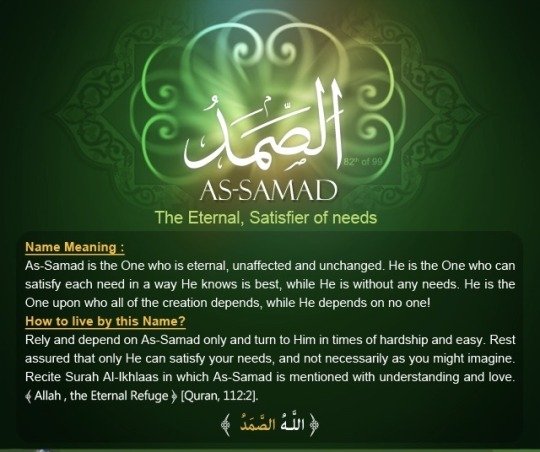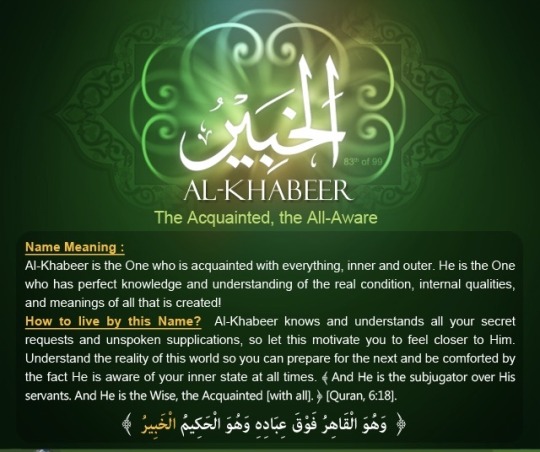#new convert
Text
Ibn al-Qayyim رحمه الله said:
“The most beneficial remedy is that you preoccupy yourself with thoughts of what should concern you and not those that should not concern you.
Thinking about what does not matter to you is the door of every evil. Whoever reflects upon what does not concern him, then he will miss what does concern him.”
[al-Fawa’id 1/175]
#islam#quote#allah#hijab#knowledge#inspirational quotes#islamicadvice#islam4 life#jilbab#la ilaha illa allah#islamicreminders#islamicart#islamicquotes#islamic#muslim revert#muslim#muslimah#muslim reminder#new convert#convert to islam#muslim convert#quran online#quran kareem#quranic#holy quran#quran#quran ayah
29 notes
·
View notes
Text
That person is close to Allah Subhanuhu wa Ta'ala who is kind and affectionate towards the creation.
Abdul Qadir Jilani (Rahimahullah)
#allah#god#islam#muslim#revert#reverthelp#reverthelp team#convert#new revert#new convert#new muslim#muslim revert#muslim convert#welcome to islam#revert to islam#convert to islam#how to convert to islam#prophet#muhammad#quran#sunnah#hadith#dua#pray#prayer#salah#help#religion#muslimah#quote
16 notes
·
View notes
Text

Allah calls Himself As-Samad— The Eternal, Satisfier of Needs, the Refuge and Absolute— on one occasion in the Quran. As-Samad is the unchangeable one on whom the entire creation depends. He is the one unaffected by any circumstance and the only one able to fulfil all needs in the most perfect way, without Himself being in need of anything or anyone!
The Eternal, Everlasting Refuge, Satisfier of All Needs
Samad comes from the root saad-meem-daal, which points to two main meanings. The first main meaning is to reach or attain, or to aim toward something. The second main meaning is to turn to and to need, and the third is to remain unchanged and unaffected. The fourth main meaning is to be everlasting and eternal.
This root appears just once in the Quran, as the noun samad. The example is al-samadu (“The Eternal, Absolute”).
Linguistically, samad means something that is not affected by circumstances or something that is solid. Sumood refers to the concept of being firm and steadfast.
As-Samad is the the One who is not changed nor affected by anything in the creation, He is the eternal and absolute refuge to seek and depend on for all needs and desires.
As-Samad Himself says: Say, ‘He is Allah , [who is] One, Allah , the Eternal Refuge. He neither begets nor is born, nor is there to Him any equivalent.’ [Quran, 112:1-4]
A description of Allah
The only place in the Quran Allah ‘azza wa jall calls Himself As-Samad is in Surah Al-Ikhlaas; the virtuous surah mentioned in the authentic hadith in Muslim to equal one-third of the Quran. This short, but amazingly beautiful and profound surah is a description of Allah Himself, His Oneness, His samad’yyah and His incomparability. Allah revealed this surah as a powerful answer to the people of Makkah who asked the Prophet salallahu ‘alayhi wa sallam to describe His Lord and His ‘lineage.’
What is ikhlaas (sincerity)? It is doing deeds purely for Him and to seek His pleasure, because He is Al-Ahad, the One and Unique. It is turning to Him for our needs and desires and desire Him only, because He is As-Samad, The Eternal and Satisfier of Needs, and it is to live by the fact that there is no one equal to Him in any of His attributes!
How can you live by this name?
1. Recite and live by Surah al-Ikhlaas.
Recite Surah Al-Ikhlaas often to gain reward, but not only that; learn to understand each word and live by the names of Allah mentioned in it. Love to recite this surah and talk about it to others as you are describing your Lord. Learn how to correctly recite it and convey it to at least one other person and teach your children the history and/or tafseer (explanation) of this virtuoussurah in which As-Samad is mentioned in order to instil love of Allah in their hearts.
2. Realize your dependence on Him.
One of the meanings of As-Samad is the One who is independent and self-sufficient. If you look at a manager, for example, one who has a high position with authority over others, it still takes one note from his superiors to end his career. This person is not samad. Then look at what we need tu survive as human beings; air, water, food, and even love. Why do we often act like as if we are independent? Especially during good times when we are healthy and wealthy we tend to forget we are even dependant on As-Samad for the strap of our shoe. So remind yourself daily that you are dependent on Him.
3. Call upon Him.
Here’s a beautiful supplication the Prophet salallahu ‘alayhi wa sallam used to make as part of the morning:
“يَا حَيُّ يَا قَيُّومُ بِرَحْمَتِكَ أَسْتَغِيثُ أَصْلِحْ لِي شَأْنِي كُلَّهُ وَلَا تَكِلْنِي إِلَى نَفْسِي طَرْفَةَ عَيْنٍ”.
O Ever Living One, O Eternal One, by Your mercy I call on You to set right all my affairs. Do not place me in charge of my soul even for the blinking of an eye (i.e. a moment). [Al-Haakim, saheeh] Memorize this dua’ and say it with true desire, fully realizing your dependence on As-Samad!
4. Desire As-Samad.
Turn to As-Samad in good and bad times and rely on Him, resting assured He is the Eternal Refuge and the One who will satisfy your needs in the way He knows is best for you. If you truly believe in As-Samad, your strongest desire will be to meet Him and your only fear will be that of His displeasure. So strive to be a real servant of Allah. The disbeliever is a slave of his desires, or of fashion, his belly, and his money. So beg Him to decrease the love for this world in your heart, including love of being praised by people, and replace it with a firm desire for His pleasure alone.
Wallahu ta’alaa ‘alem
O Allah, As-Samad, we know that You are the only Eternal Refuge. Make us realize we need you at all times and aid us to be of those who turn to You only for our needs. Adorn us with a strong desire to please You alone, ameen!
#allah#islam#revert help team#asma al husna#revert help#muslim#ayat#daily#allah’s name#dua#pray#prayer#salah#muslimah#hijab#religion#reminder#mohammed#new muslim#new revert#new convert#how to convert islam#converthelp#convert islam#become a muslim#welcome to islam#daily ayat#prophet#god#revert
33 notes
·
View notes
Text
Daily Hadith
Bismillah Walhamdulillah Was Salaatu Was Salaam 'ala Rasulillah
Narrated Abu Said Al-Khudri (Radi-Allahu 'anhu):
The Prophet (Sallallahu 'Alaihi Wa Sallam) said, 'Beware! Avoid sitting on the roads." They (the people) said, "O Allah s Apostle! We can't help sitting (on the roads) as these are (our places) here we have talks." The Prophet (Sallallahu 'Alaihi Wa Sallam) said, ' lf you refuse but to sit, then pay the road its right ' They said, "What is the right of the road, O Allah's Apostle?" He said, 'Lowering your gaze, refraining from harming others, returning greeting, and enjoining what is good, and forbidding what is evil."
Bukhari Vol. 8 : No. 248
#allah#god#islam#muslim#quran#ayat#hadith#revert#convert#convert islam#revert islam#revert help team#help#islamhelp#converthelp#prayer#salah#muslimah#reminder#pray#dua#hijab#religion#mohammad#new muslim#new revert#new convert#how to convert to islam#convert to islam#welcome to islam
13 notes
·
View notes
Text
If youre converting to a religion and you ever feel like youre failing, remember at least you didn't wait a full year to respond to your rabbi's email

#jumblr#jewish convert#jewish holidays#jewish#rabbi#emails are hard#reassurance#religion#muslim convert#new convert#convert to islam#religious conversion
32 notes
·
View notes
Text









𝙰𝙸 𝙳𝚛𝚎𝚊𝚖 𝙰𝚛𝚝𝚒𝚜𝚝𝚛𝚢 - 𝙻𝚒𝚜𝚔
𝙳𝚒𝚐𝚒𝚝𝚊𝚕 𝙲𝚛𝚎𝚊𝚝𝚘𝚛
#𝚊𝚒 𝚊𝚛𝚝𝚒𝚜𝚝 🦋 𝚕𝚘𝚟𝚎 𝚊𝚍𝚍𝚒𝚗𝚐 𝚜𝚘𝚖𝚎 𝚌𝚛𝚎𝚊𝚝𝚒𝚟𝚒𝚝𝚢 𝚒𝚗𝚝𝚘 𝚎𝚟𝚎𝚛𝚢𝚍𝚊𝚢 𝚕𝚒𝚏𝚎 ✨️
𝙵𝚘𝚕𝚕𝚘𝚠 𝚖𝚎 𝚘𝚗 𝚖𝚢 #𝚊𝚒𝚊𝚛𝚝 𝚓𝚘𝚞𝚛𝚗𝚎𝚢
#𝚖𝚒𝚍𝚓𝚘𝚞𝚛𝚗𝚎𝚢 ✨️
🇦🇺
ᴡᴡᴡ.ʙᴜʏᴍᴇᴀᴄᴏғғᴇᴇ.ᴄᴏᴍ/ᴀɪᴅʀᴇᴀᴍᴀʀᴛɪsᴛʀʏ
Hem Evimsin Hem Cehennemim by Lalalar 🎧

#l o v e#black is beautiful#midjourney#aidreamartistry#fantasy#12/2023#digital art#african#female#3d#neo pop art#new contemporary#new convert#ai art#ai#mythology#x-heesy#fucking favorite#music and art#contemporaryart#australia#girl i wanna eat ya
35 notes
·
View notes
Text
THE FEMALE COMPANIONS OF THE PROPHET (PBUH): Part 17
HAMNA BINT JAHSH (radhiallahu anha)
Hz. Hamna was the daughter of Umayma bint Abdulmuttalib, the paternal aunt of the Prophet. She was also the sister of Zaynab bint Jahsh, one of the wives of the Prophet. Thus, she was the sister-in-law of the Prophet. She became a Muslim in the first years of Islam. She was loyal to the Prophet with her heart. She was married to Mus’ab bin Umayr, one of the great Companions. They led a happy life.
Hz. Mus’ab took part in the battle of Uhud and fought heroically.
The Muslims were about to gain a big victory but when the archers located by the Messenger of Allah left their places, the course of the battle changed. The Muslims were defeated. It was also rumored that the Messenger of Allah was martyred.
When the female Companions who were in Madinah heard this, they ran to the battlefront. Hamna bint Jahsh, the wife of Mus’ab bin Umayr, was also among them. When they heard that the Messenger of Allah was alive, they became very happy.
However, Hz. Mus’ab was martyred. In addition, Hz. Hamna’s brother Abdullah bin Jahsh and her maternal uncle Hz. Hamza was also martyred. The Prophet wanted to give this news to Hamna himself. When Hamna came over to him, he said,
“O Hamna! Show patience and seek reward from Allah!”
Hamna said,
“O Messenger of Allah! For whom shall I show patience?”
The Prophet said,
“For your maternal uncle Hamza.”
Hz. Hamna was a woman who believed in qadar. She said,
“We are slaves of Allah and we will return to Him. May Allah show him mercy and forgive him! May Allah give him glad tidings and rejoice him with the reward of martyrdom!”
The Prophet said,
“O Hamna! Show patience and seek reward from Allah!”
Hamna said,
“O Messenger of Allah! For whom shall I show patience?”
The Prophet said,
“For your brother.”
Hz. Hamna said in patience and resoluteness,
“We are slaves of Allah and we will return to Him. May Allah show him mercy and forgive him! May Allah give him glad tidings and rejoice him with the reward of martyrdom!”
The Prophet said,
"O Hamna! Show patience and seek reward from Allah!”
Hamna said in suspense,
“O Messenger of Allah! For whom shall I show patience?”
The Prophet said,
“For Mus’ab bin Umayr.”
Hz. Hamna, who had not lost her patience and resoluteness up to that time, changed suddenly. She thought about her children and started to cry by saying,
Thereupon, the Messenger of Allah (pbuh) said,
“There is no doubt that a man has a different place in the eye of his wife. Hamna showed patience and resoluteness when she heard about the death of her maternal uncle and brother but she could not maintain her resoluteness when she heard the death of her husband.”( Sirah, 3: 104. )
Hz. Hamna could not show the same patience for her husband but she did not oppose qadar. She calmed down with the prayer and consolation of the Messenger of Allah.
Hamnah later married Talha bin Ubaydullah, one of the ten Companions who were given the good news that they would go to Paradise. They led a happy life. They had two children called Muhammad and Imran.
#Allah#god#islam#quran#muslim#revert#revert islam#convert#convert islam#converthelp#reverthelp#revert help#revert help team#help#islam help#salah#dua#prayer#pray#reminder#religion#mohammad#muslimah#hijab#new muslim#new revert#new convert#how to convert to islam#convert to islam#welcome to islam
10 notes
·
View notes
Text
Sunan an Nasa’i: The Book of Fasting, Book 22, Hadith 2420
It was narrated from Jarir bin 'Abdullah that the Prophet said:
"Fasting three days of each month is fasting for a lifetime, and the shining days of Al-Bid, the thirteenth, fourteenth and fifteenth."
#allah#islam#quran#dua#god#convert#revert#revert help#revert help team#muslim#muslimah#reverthelp#converthelp#islam help#prayer#pray#salah#religion#reminder#hijab#mohammad#revert islam#convert islam#convert to islam#welcome to islam#how to convert to islam#new revert#new muslim#new convert
11 notes
·
View notes
Text
The Life of The Prophet Muhammad(pbuh): Farewell Hajj and the Death of the Prophet (pbuh)
The Last Days of the Prophet Narrated by His Close Relatives
Hazrat Aisha narrates one of her memoirs with the Prophet as follows:
“When the Messenger of Allah (pbuh) came to my house, I had a pain in my head. Due to the severity of the pain, I said, ‘O my head!’
When the Messenger of Allah heard it, he said, ‘It is not important; why are you sorry? If you die before me, I will enshroud you and perform your janazah prayer.’
I said, ‘Do you want my death?’”
Hazrat Aisha spoke like that because she did not understand that the Prophet was joking.
The Messenger of Allah ended his joke as follows:
“O Aisha! Your headache will be all right. The real headache is mine; it is very difficult to recover it from now on.”
The Prophet and Hazrat Abu Bakr
Hazrat Abu Bakr, who was always at the peak of loyalty to the Prophet everywhere, went to the presence of the Messenger of Allah and stated that it would be an honor for him to serve him as follows:
“O Messenger of Allah! If you let me, I want to serve you when you are ill.”
The Messenger of Allah did not let him but his answer conquered Abu Bakr’s heart:
“O Abu Bakr! You have already received the reward for the service that you wanted to do. However, if I let others service me when I am ill, my daughter and my wives will be sorry.”
The Gravest Illness, the Greatest Pain
The Prophet could not lie still in his bed due to the severity of his illness and the high fever. He was turning to the right and left in his bed.
Those who were near him said, “O Messenger of Allah! If one of us showed that he suffered so much pain, you would scold him.”
The Messenger of Allah said,
“My illness is not like the ones that you know. Allah inflicts the most severe troubles, illnesses and misfortunes on His righteous and believing slaves. However, due to that trouble, illness and misfortune, He elevates the rank of that person and eliminates his sins.”
Hazrat Aisha said,
“We have never seen an illness more difficult and severe than the illness of the Messenger of Allah.”
Ibn Mas’ud Narrates
Abdullah Ibn Mas’ud describes the severity of the illness of the Prophet as follows:
“I went to the presence of the Prophet when his body was shaking due to the severity of the fever. I said,
‘O Messenger of Allah! You are suffering a lot due to the severity of the fever. O Messenger of Allah! This fever gives you double pain; it will definitely give you double reward.’ He approved what I said as follows:
‘Yes. There is no Muslim who suffers an illness and whose sins Allah does not shed like a tree sheds its leaves.’”
Umm Bishr Narrates
Umm Bishr, Bishr b. Bara’s mother, who visited the Messenger of Allah when he was ill, narrates what she saw as follows:
“I went to see the Messenger of Allah. When I saw the severe temperature in his body, I could not help saying,
‘O Messenger of Allah! I have never seen such a fever.’
The Messenger of Allah (pbuh) said,
‘Our illness is more severe than the illnesses of other people but the reward that we will get will be more.’”
The Messenger of Allah Wants Pen and Paper to Have Something Written
It was the month of Rabiul-Awwal, 8, Thursday…
The most painful moments of the illness of the Messenger of Allah… There were Hazrat Umar and some other people around him. He said, “Bring me pen and paper; I will write you something so that you will never deviate from your way after that.”
Hazrat Umar said, “His illness is dominant over the Messenger of Allah (pbuh). We have the Quran. Allah’s book is enough for us.”
They hesitated to bring pen and paper.
Some people confirmed the words of Umar. Others thought it was necessary to bring pen and paper. When the Messenger of Allah noticed that there was a disagreement, he said, “Leave me. Do not argue near me. Leave me alone.”
Thus, what the Messenger of Allah wanted to be written could not be written.
The Day When His Illness Gets Better
The disease of the Messenger of Allah was getting worse day by day and hour by hour. Once, he wanted cold water. He had the water poured on his body.
After that, he felt a bit relieved. When he noticed it, he leaned on Hazrat Ali and Fadl b. Abbas and went to the mosque. He ascended to the pulpit and sat there. He addressed the Companions as follows:
“O people! I have heard that you panic because I will die. No prophet lived eternally among their ummah; how should I live? Know that I will meet my Lord soon; you will meet Him, too.
O Ansar! I advise you to do favors to muhajirs.
O muhajirs! I advise you to do favors to Ansar. They helped you. They allowed you to their land. They entertained you in their houses. Although they were in financial difficulty, they helped you. If any of you rules them, he should do favors to them.
O people! Everything happens in accordance with the pre-eternal divine will of God Almighty. Do not try to overcome Allah’s qada and qadar; you will be defeated. Do not try to trick God Almighty; you will be the one that loses. I am compassionate and merciful to you. You will meet me again. The place where we will meet is near the Pond of Kawthar. If you want to meet me near the Pond of Kawthar, keep your hands and tongues away from unnecessary things.
O people! Know it very well that committing sins causes to change bounties and kismets. If the majority of the people are good, their administrators will treat them justly. If the people tend to disobey and commit sins, their administrators will tend to oppress them and treat them unjustly.”
After this address, the Prophet went to Aisha’s house and went to bed.
#islam#allah#revert#reverthelp#muslim#quran#convert#muhammad#pray#god#convert islam#revert islam#reverthelp team#revert help#islamhelp#converthelp#prayer#salah#muslimah#reminder#new muslim#new revert#new convert#how to convert to islam#welcome to islam
8 notes
·
View notes
Text
Outside
#outdoors#nude outside#naked outside#so freaking hot#existential dread#red hair#domme mommy#tattoos#why#black and white#red hood#18+ only#sexy content#new convert
10 notes
·
View notes
Note
What are the conditions for worship to be accepted by Allah?
There is only one condition for the worship to be accepted by Allah. It is sincerity.
Sincerity is like the spirit of the worship that is performed. Worship without sincerity is spiritless; it is only formality. It has no value in the eye of Allah.
Sincerity in worship means to worship only because it is the order of Allah and it is a means of gaining the consent of Allah. Badiuzzaman Said Nursi expresses this issue as follows:
"Worship and servitude of God look to the Divine command and Divine pleasure. The reason for worship is the Divine command and its result is Divine pleasure. Its fruits and benefits look to the Hereafter."
If sincerity is used for a worldly interest and benefit, sincerity will disappear and that worship will be invalid; that is, it will not be accepted by Allah.
In a hadith, the Prophet states the place of sincerity in the deeds and worship as follows:
"Doubtlessly, Allah accepts among deeds and worships only those that are performed sincerely for His own sake and consent."
#Allah#god#islam#quran#muslim#revert#convert#revert islam#convert islam#reverthelp#revert help#revert help team#help#islam help#converthelp#prayer#salah#muslimah#reminder#pray#dua#hijab#religion#mohammad#new muslim#new convert#new revert#how to convert to islam#convert to islam#welcome to islam
12 notes
·
View notes
Text
﴿وَهَيِّئْ لَنَا مِنْ أَمْرِنَا رَشَدًا﴾
قال الإمام ابن القيم
رحمه الله:
الرشد: هو العلمُ بما ينفع، والعمل به.
"And prepare for us from our affair right guidance.(Rushd)." ● [18:10]
Imam Ibn Al-Qayyim رحمه الله said: "Rushd is the beneficial knowledge and acting in accordance to it."
● {إغاثة اللهفان ٢/٩٠٥}
#islam#quote#allah#hijab#knowledge#inspirational quotes#islamicadvice#islam4 life#jilbab#la ilaha illa allah#islamicreminders#islamicart#islamicquotes#islamic#muslim revert#muslim#muslimah#muslim reminder#hadith#revert islam#revert#convert to islam#new convert#converthelp#muslim convert
31 notes
·
View notes
Text
Whoever listens to a verse of the Quran, it is a light for him.
Ibn Abbas (Radiallahu anhu)
#allah#god#islam#muslim#revert#reverthelp#reverthelp team#convert#new revert#new convert#new muslim#muslim revert#muslim convert#welcome to islam#revert to islam#convert to islam#how to convert to islam#prophet#muhammad#quran#sunnah#hadith#dua#pray#prayer#salah#help#religion#muslimah#quote
127 notes
·
View notes
Text

Allah calls Himself Al-Khabeer— The Acquainted, the All-Aware — on six occasions in the Quran. He is the one who knows the true reality of all that is created. Al-Khabeer is aware of, knows about, and has understanding of all inner states, internal qualities, and the meanings of all things!
The Acquainted, All-and Fully Aware, Knower of Reality
Khabeer comes from the root khaa-baa-raa, which points to two main meanings. The first main meaning is to know, to be aware, and to understand the reality or inner nature of something. The second main meaning is to test, prove, and try by experience which results in inner knowledge.
This root appears 52 times in the Quran in four derived forms. Examples of these forms are akhbaarakum (“your affairs”), khubran (“any knowledge, information”), and akhbaarahaa (“its news”).
Linguistically, khabeer is derived from khibrah, which is the concept of comprehending and encompassing the inner and outward realities of things. It is said, khabartu ash-shay (I attained proper knowledge of something) when I came to know it upon its reality (i.e. as it truly is). Hence, He, the Sublime, is al-Khabeer, meaning the one who has encompassed the innermost, and the hidden realities of things, and the outward realities of things. [Sharh Aqidatul-Wasitiyyah of al-Fawzan]
Al-Khabeer Himself says: . . . [He is] Knower of the unseen and the witnessed; and He is the Wise, the Acquainted. [Quran, 6:73] . . . Vision perceives Him not, but He perceives [all] vision; and He is the Subtle, the Acquainted [Quran, 6:103] [All] praise is [due] to Allah , to whom belongs whatever is in the heavens and whatever is in the earth, and to Him belongs [all] praise in the Hereafter. And He is the Wise, the Acquainted. [Quran, 34:1]
The ultimate awareness and knowledge of Allah
Allah is the one whose knowledge encompasses all that is outward and hidden, all things that occur, have occurred, and will occur of the affairs of the whole creation. There is nothing that is hidden from Him. Allah ‘azza wa jall paired His attribute of being khabeer with His attribute of all-encompassing knowledge.
Allah says: Verily Allah! With Him (Alone) is the knowledge of the Hour, He sends down the rain and knows what is in the wombs. No person knows what he will earn tomorrow and no person knows in what land he will die. Indeed Allah is All-Knowing, All-Aware. [Quran, 31:34]
It is Allah who has knowledge of both the seen and unseen and it is He who can perceive our inner nature and intentions. O Mankind! We have created you from a male and a female and made you into nations and tribes that you may know each other. Verily, the most honourable of you in the Sight of Allah is the most God-Fearing of you. Indeed Allah is the All-Knower, the All-Aware. [Quran,49:13]
In the Quran, Allah’s being khabeer is most often combined with His attribute of wisdom (Al-Hakeem), of seeing (Al-Baseer), and subtleness (Al-Lateef).
How Can You Live by This Name?
1. Be comforted by Al-Khabeer.
Allah Al-Khabeer is the only one who is aware of all you do, say, hide, and want. Let this amazing fact comfort you in times of hardship, and in times of ease remind yourself to not get too attached to this world and its material benefits. Allah beautifully says: Does He who created not know, while He is the Subtle, the Acquainted?[Quran, 67:14]
2. Know that Al-Khabeer will inform you.
Not only is Allah acquainted with all your deeds, on the Day of Judgement He will inform you about all you used to do. Remember this each day and let it motivate you to do good deeds. When you slip, ask Him for forgiveness in this life so you will be saved from His punishment in the next.
That is Allah, your Lord; to Him belongs sovereignty. And those whom you invoke other than Him do not possess [as much as] the membrane of a date seed. If you invoke them, they do not hear your supplication; and if they heard, they would not respond to you. And on the Day of Resurrection they will deny your association. And none can inform you like [one] Acquainted [with all matters]. [Quran, 35:13-14]
3. Understand the reality of this world.
The Prophet salallahu ‘alayhi wa sallam happened to walk through the bazaar coming from the side of ‘Aliya and people were on both sides of him. There he found a dead lamb with very short ears. He took hold of its ear and said: ‘Who amongst you would like to have this for a dirham?’ They said: ‘We would not like to have it even for less than that as it is of no use to us.’ He said: ‘Do you wish to have it (free of any cost)?’ They said: ‘By Allah, even if it were alive (we would not have liked to possess it), for there is defect in it, as its ear is very short; on top of that it is dead now.’ Thereupon, Rasul Allah (sal Allahu alaihi wasallam) said: ‘By Allah, this world is more insignificant in the eyes of Allah than (this dead lamb) is in your eyes.’ [Muslim]
Understand the insignificance of this world, but know that at the same time this life is your only chance to strive for your eternal place in Paradise. So make your life worth something by paying heed to the reminders of Allah and His Prophet and fill it with actions that will benefit your next life!
4. Make sure to do hidden good deeds.
Al-Khabeer says: If you disclose your charitable expenditures, they are good; but if you conceal them and give them to the poor, it is better for you, and He will remove from you some of your misdeeds [thereby]. And Allah , with what you do, is [fully] Acquainted. [Quran, 2:271]
Be motivated to do good deeds not for the eye of the people but for Allah Al-Khabeer! This means you will thoroughly enjoy those good deeds you can hide as you know you do them for Al-Khabeer and the fact only He knows about them will make you feel close to Him.
5. Adhere to the laws of Al-Khabeer.
In the Quran Allah ‘azza wa jall mentions His attribute of being acquainted with all you do often after He has mentioned one of His laws. Follow the rules and laws Al-Khabeer laid out for you in the Quran and through the sunnah to your best ability.
6. Don’t judge people too quickly.
We are often quick to judge others. Don’t forget that you don’t have knowledge of the inner reality of others; only Al-Khabeer does. Therefore be careful in judging others not only by criticising them but also by over-praising them. Always say: I leave your judgement to Allah!
O Allah, Al-Khabeer, we know that You are aware of all things. Guide us to the best inner and outer characteristics and aid us in our manners with others. Assist us in abiding by Your rules and make us aware of the reality of this world and how to strive best for Your Paradise, ameen!
#allah#islam#revert help team#asma al husna#revert help#muslim#ayat#daily#allah’s name#dua#pray#prayer#salah#muslimah#hijab#religion#reminder#mohammed#new muslim#new revert#new convert#how to convert islam#converthelp#convert islam#become a muslim#welcome to islam#daily ayat#prophet#god#revert
22 notes
·
View notes
Text
Daily Hadith
Bismillah Walhamdulillah Was Salaatu Was Salaam ‘ala Rasulillah
Narrated Abu Musa (Radi-Allahu 'anhu):
The Prophet (Sallallahu 'Alaihi Wa Sallam) said, “Free the captives, feed the hungry and pay a visit to the sick.”
Bukhari Vol. 4 : No. 282
#allah#god#islam#muslim#quran#ayat#hadith#revert#convert#convert islam#revert islam#revert help team#help#islamhelp#converthelp#prayer#salah#muslimah#reminder#pray#dua#hijab#religion#mohammad#new muslim#new revert#new convert#how to convert to islam#convert to islam#welcome to islam
13 notes
·
View notes
Text
Riyad as-Salihin, The Book of Knowledge, Book 12, Hadith 4
Chapter: Virtues of Knowledge which is Learnt and Taught for the sake of Allah
Sahl bin Sa'd (May Allah be pleased with him) reported:
The Prophet (ﷺ) said to 'Ali (May Allah be pleased with him), "By Allah, if a single person is guided by Allah through you, it will be better for you than a whole lot of red camels."
[Al-Bukhari and Muslim].
#allah#god#Muslim#quran#revert#convert#convert islam#revert islam#reverthelp#revert help#revert help team#help#isalmhelp#converthelp#hadith#new muslim#new revert#new convert#how to convert to islam#convert to islam#welcome to islam#islam
27 notes
·
View notes